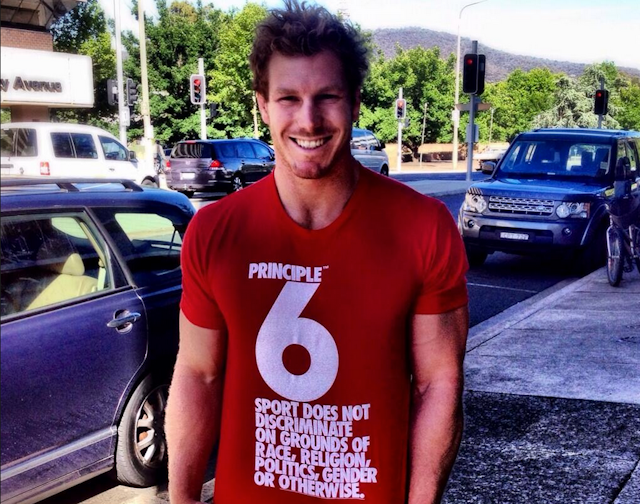What happens off the field stays off the track and the dais but plays OK at the press conference – that is the rather convoluted message from International Olympic Committee (IOC) president Thomas Bach in the face of potential political protests at the Sochi Winter Olympics.
Bach is trying to narrow the scope available to dissenting Olympic athletes. They face punishment if they make their move when medals are being contested or dispensed. The local Games organisers want to go further by confining shows of activism to a “Speakers’ Corner” somewhere in Sochi city.
Such is the complexity of life for the activist athlete at the “Prolympics”. And Sochi and Russia have certainly given the politically aware athlete plenty to work with. Last year, Russia passed laws making it an offence to discuss homosexuality with minors.
To avoid any awkward ambiguity, Sochi mayor Anatoly Pakhamov recently fouled the welcome mat of his Olympic city when he stated that:
[homosexuality] is not accepted here in the Caucasus where we live. We do not have them in our city.
Much has changed since the days when officials could rule their young athletic charges with a rod of iron. This does not mean that the balance of power has shifted entirely. But today’s “blazerati” are required to negotiate with athletes who can create a storm of controversy with a brief gesture on live television or a single tweet.
Athletes harness their fame
In recent decades sportspeople have joined the likes of film and pop stars in the global celebrity ranks. It is hardly surprising that some have emulated activist actors and “protest” singers in using their fame to advance social causes, such as those in support of the Principle 6 campaign against Russia’s anti-gay laws.
At one time film studios would discourage such activities for fear of damage at the box office. Record company executives would worry about alienating apolitical music fans. But screen and music celebrities became bigger than the companies that housed them, and greater political autonomy for artists followed.
Sport, with its rigid hierarchies and myths of transcending the lives of mere mortals, has been a harder nut to crack for activist athletes. They are still vulnerable to being labelled troublemakers and malcontents.

Big-name sportspeople, though, wield their own power. They commonly run their own charitable foundations as a way of “giving something back”. It would be overly cynical to dismiss this in all cases as a calculated extension of image manufacture and tax minimisation, but it is unlikely to provoke debate or conflict.
Taking a strong political stance is a more hazardous extra-curricular activity. It will certainly engage those with conflicting points of view. It is also likely to make sports’ governing bodies nervous about their relationships with corporate sponsors and governments.
Olympians and other sportspeople are now more likely to use conventional and social media to present views. Even if sport officials can ban athletes from engaging in social media at certain times (such as a ski jumper standing at the top of the hill), they cannot continually patrol digital communication. Doing so opens them up to charges of unwarranted interference and censorship.
Hence the concentration on the times when the “whole world is watching”, the live competition and ritual.
Seizing the moment
It is hard to discuss this issue without conjuring up images of the black power salutes by American 200-metre runners Tommie Smith and John Carlos on the medals podium at the 1968 Mexico Olympics. Australian Peter Norman wore an Olympic Project for Human Rights badge in solidarity with Smith and Carlos, who were expelled from the Games.
Norman was ostracised by Australian Olympic officialdom. His treatment led to a belated parliamentary apology in 2012, six years after his death.

The IOC would be most unhappy if, for example, victorious Sochi Olympians wore rainbow-coloured gloves in solidarity with lesbian, gay, bisexual, transgender and intersex (LGBTI) people as their countries’ flags were raised. But there is much more to athlete activism than visual podium polemic.
It might involve joining an Amnesty International campaign, as Australian rugby player David Pocock has done, to end discrimination against Russia’s LGBTI community. Or a soccer player like Manchester United’s Rio Ferdinand speaking in support of Kick It Out, football’s equality and inclusion campaign founded by the Professional Footballers’ Association.
But what counts as athlete activism may be much more unstructured and unpredictable than dedicated sport-related campaigns. Few are as strange as the unilateral diplomacy pursued by retired basketballer Dennis Rodman in North Korea.
The activism may also not be progressive. There is a history of loaded on-field gestures such as the Fascist-linked “Roman salute” by Italian footballer and manager Paolo di Canio to Lazio supporters in 2005 and the “quenelle” – said to be an inverted Nazi salute – that England-based French footballer Nicolas Anelka performed late last year.
Greek triple jumper Voula Papachristou was expelled just before the London 2012 Olympics for posting tweets that mocked African immigrants and supported the far-right Golden Dawn Party.
The relationship between politics and sportspeople is many-sided. It ranges from carefully planned strategic interventions to seemingly unpremeditated signals and utterances.
Images of the Olympic black power protest or of AFL player Nicky Winmar lifting his jumper in 1993 to display his black skin in proud defiance of sustained racial abuse from Collingwood supporters are lasting reminders of sport’s power to crystallise a burning issue such as racism.
Each mega sport event offers a fresh opportunity for athlete activists to run the gauntlet of official disapproval in pursuit of unparalleled visibility for their cause. The Sochi Winter Games may be remembered less for gold-medal winning performances than for a media blizzard of activist athlete-generated politics.

